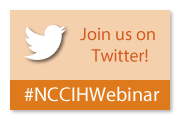| Date and Time:
Tuesday
October 29thth, 2019
12:00PM - 1:30PM PST
3:00PM - 4:30PM EST Registration Details: GoToWebinar - Link Please note webinar registration is limited to 500 participants. This webinar will be recorded; by registering for this webinar you are providing your consent to this recording. The webinar registration and delivery is in English only. Under Canada's anti-spam legislation, by registering for this webinar, you agree to receive information from the NCCIH regarding knowledge resources, publications and activities. We won't share your email with anyone and you can unsubscribe at any time. |

Lisa Richardson, Clinician-Educator
University of Toronto's Division of
General Internal Medicine and
Education Researcher at
The Wilson Centre
Suggested Reading
Access to health services as a
social determinant of First Nations,
Inuit and Métis health

Join the NCCIH on Twitter |
Indigenous peoples' access to health services: Overcoming barriers to support wise practices A webinar hosted by the National Collaborating Centre for Indigenous Health (NCCIH). Webinar Description Reasonable and equitable access to universal health services facilitates earlier diagnosis, lowers mortality and comorbidity rates, and leads to improved physical, mental, emotional, and social outcomes. Widely recognized as an important determinant of health, access to health services is, however, not equally nor universally available to all Canadians. Most notably, Indigenous peoples continue to experience barriers to health care, resulting in significant and ongoing health disparities compared to other Canadians. The focus of this webinar is to explore Indigenous peoples' access to health services including experiences of colonization, "otherness" and racism as both patients and providers. Of equal importance, the webinar will focus on strategies and innovations that remove barriers to access to health services and that integrate Indigenous experiences, knowledge and resilience into the provision of health care. Dr. Richardson will refer to case studies from the Northern Ontario School of Medicine, the Women's College Hospital, the University of Toronto's Faculty of Medicine, and the Royal College of Physicians and Surgeons, to discuss "wise practices" in the delivery of health services to Indigenous peoples. Examples of locally appropriate Indigenous actions and trauma-informed care, fundamental to wise practices and for sustainable and equitable change in Indigenous peoples' access to health services, will be explored. These include the use of Indigenous navigators, access to traditional foods and healing practices, support from Elders, and land-based healing, to name a few. Learning Objectives
- Examine how accessibility, availability and acceptability of health services have indirect and direct impacts on Indigenous peoples' health and health outcomes.
- Define "wise practices" and demonstrate its application in healthcare settings.
- Explore how the frameworks of cultural safety, anti-racist practice and trauma-informed care can strengthen leadership skills and ultimately Indigenous health equity.
- Understand, recognize and identify opportunities to apply the concept of Indigenous allyship in leadership roles.
Presenter Lisa Richardson is a clinician-educator in the University of Toronto's Division of General Internal Medicine, and practices at the University Health Network. Her academic interest lies in the integration of critical and Indigenous perspectives into medical education and she is an education researcher at The Wilson Centre. She holds the roles of Strategic Advisor in Indigenous Health for the University of Toronto's Faculty of Medicine and is also the Indigenous Strategy Lead for Women's College Hospital. She co-leads a new portfolio for the Department of Medicine called Person-Centered Care Education. She chairs several provincial and national committees to advance Indigenous medical education, and has been honoured with the Royal College of Physicians and Surgeons' Thomas Dignan Award for Indigenous Health. Suggested Reading National Collaborating Centre for Indigenous Health. (2019). Access to health services as a social determinant of First Nations, Inuit and Métis health. Prince George, BC: Author. |